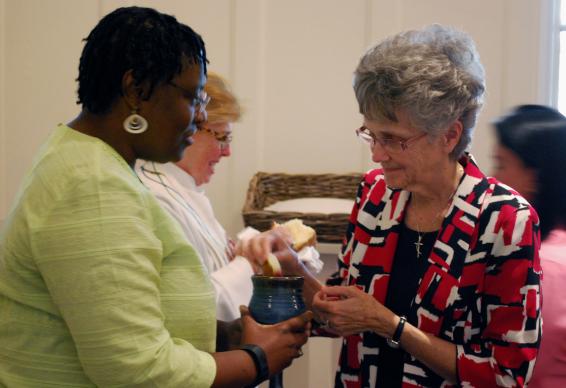Directors for United Methodist Board of Church and Society gear up to exercise social holiness.
LINDA BLOOM
United Methodist News Service
Addressing today’s toughest social issues — racism, migration, poverty, human rights, climate change — on behalf of the church can be a daunting task.
But as the United Methodist Board of Church and Society organized itself during a Sept. 21-24 meeting, the 62-member body was starting to shape some concrete goals for the next four years under the agency’s new theme, “Living Faith, Seeking Justice and Pursuing Peace.”
The social action agency’s mandate from General Conference, the denomination’s top legislative body, is to implement the 75 statements of the Social Principles and the 373 social resolutions found in the Book of Resolutions. It also is supporting the church-wide focus on Ministry with the Poor.
“Our mission is rooted in Methodism’s long commitment to social holiness,” said the Rev. Susan Henry-Crowe, the board’s top executive.
The Social Principles “are at the core” of the denomination’s identity, she explained. “They provide reflection and guidance for United Methodists on pressing matters of the day.”
The mostly new directors, along with others returning for a second term, also learned from Melissa Rogers, special assistant to President Obama and executive director of the White House Office of Faith-based and Neighborhood Partnerships, how religious groups can take specific actions to improve people’s lives.
Intersecting priorities
A bylaws restructure approved by directors aligns the program work into three areas — advocating, educating and connecting. Each work area will engage the agency’s program priorities, including civil and human rights, economic and environmental justice, health and wholeness, peace and international affairs and abundant life for women and children.
Most issues facing society intersect with each other, Henry-Crowe told United Methodist News Service. “You really can’t talk about migration without talking about climate change or poverty. And you can’t talk about civil rights without talking about poverty and race.”
With 13 million United Methodists around the world, “the voices of that many people thinking together and addressing issues together in practical ways really does make a difference,” she said.
Chicago Area Bishop Sally Dyck, the new board president, pointed to the role of Church and Society in exploring the root causes of issues and helping the church understand the world.
“We all have this little pinpoint view into the world and it takes all of these pinpoint views (together) … that’s why it’s important we have diversity on this board as well as in the church so we can share our pinpoint views to see a bigger picture,” she said.
Young people are part of that diversity. “Engaging young people in justice movements is really important, to help them have new understandings of what the church can be,” Henry-Crowe said.
Presence on Capitol Hill
Rogers traveled from the White House to Capitol Hill to speak to directors on Sept. 23 after they toured the United Methodist Building, a United Methodist heritage landmark across from the U.S. Supreme Court, where the Board of Church and Society is based.
As former staff of the Baptist Joint Committee on Religious Liberty, she was familiar with both the neighborhood and the church’s building, where she has attended many meetings. “Whenever I walk through this door I feel like I am at home,” she told the group.
Rogers gave a snapshot of the work — both domestic and international and through partnerships and policy — handled by her small White House office and the larger number of faith-based and neighborhood partnership centers found in many federal agencies.
Faith-based cooperation can come through financial partnerships, where the government gives money to a religious entity to do a specific task, or less formal non-financial partnerships that focus on sharing information and best practices.
Religious groups play an “essential role” in assisting people who need access to services — veteran’s benefits, mental health care, drug treatment, health care — by deploying information into communities in a way that her office or the federal government cannot, Rogers said.
When the Affordable Care Act was launched to provide health care options for Americans, “we worked with lots of churches and other houses of worship to hold enrollment sessions after their worship services,” Rogers said.
After first enrollment period, her office had a debriefing with those who had assisted customers and learned what needed to be fixed or clarified. “It’s a real two-way street,” she added. “That’s how we learn. That’s how we get better at what we do.”
Church-state policy
The White House Office on Faith-based and Neighborhood Partnerships also looks at religion-related issues through the lens of the First Amendment and other constitutional protections. “We treat church-state policy just like we treat health policy or education policy,” Rogers explained. “It’s all very important.”
President Obama, she noted, “cares deeply about people of faith and what they experience” and is always looking for creative options to bridge differences.
That care, Rogers said, was evident during what has been the highlight of her time in the White House the September 2015 visit of Pope Francis to Washington. The president instructed his staff to work on commitments the Obama Administration could make “that reflect the values we share with Pope Francis.”
Those commitments included increasing the annual totals of refugees admitted to the United States and creating a new post at the State Department to advise personnel on religious minorities in the Middle East and Central Asia. The administration also connected with a number of partners to address climate change issues, including Catholic partners. Related areas of concern included disaster response preparation and learning to be good stewards of earth’s resources, she added.
All of that fit in with the Pope’s concern for refugees and his encyclical on the environment. “I certainly feel like the president and the pope were singing out of the same hymnal,” Rogers said.
Last Updated on October 27, 2023

